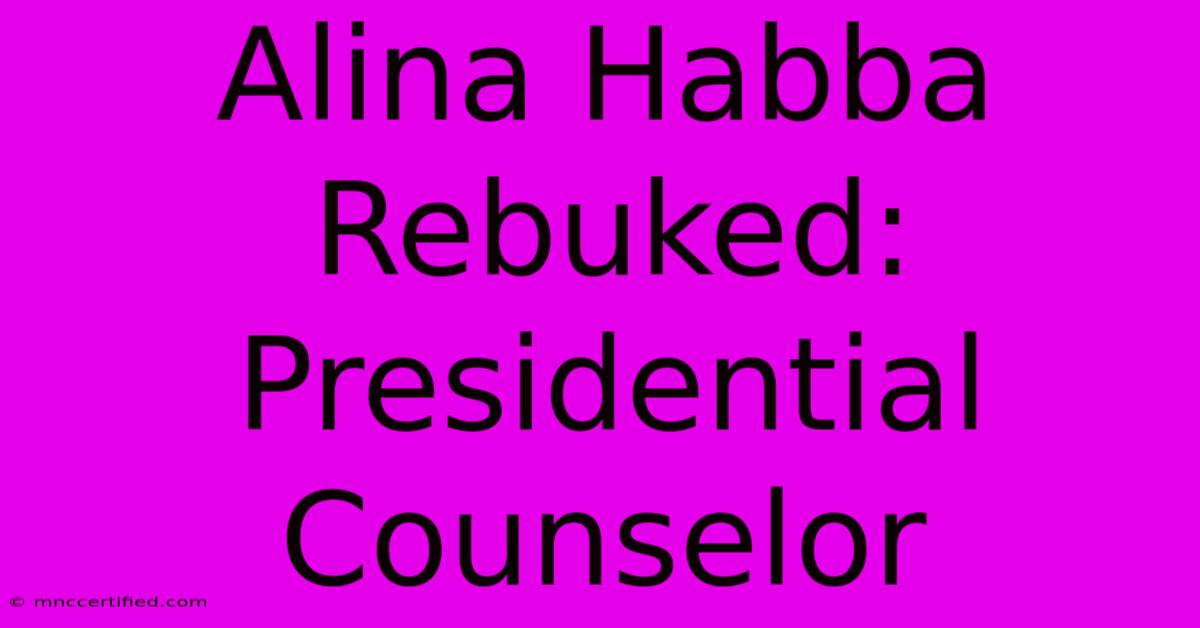Alina Habba Rebuked: Presidential Counselor

Table of Contents
Alina Habba Rebuked: A Presidential Counselor Under Scrutiny
Alina Habba, a prominent attorney known for her representation of former President Donald Trump, has recently faced significant professional scrutiny. This article delves into the key events leading to her rebuke, exploring the ethical considerations and legal ramifications involved. Understanding this situation requires examining her role as a presidential counselor and the controversies surrounding her legal actions.
The Controversies Surrounding Alina Habba
Habba's career has been marked by several high-profile cases, most notably her involvement in defending Donald Trump against various legal challenges. This close association has placed her under intense public and media scrutiny. The controversies surrounding her extend beyond simple legal representation, touching on questions of ethical conduct and potential conflicts of interest.
Ethical Concerns and Legal Ramifications
Several instances have raised significant ethical concerns regarding Habba's conduct. These include allegations of:
- Misrepresentation of facts: Accusations of presenting misleading information to courts and the public have been leveled against her. These accusations require careful examination, as misrepresentation is a serious ethical violation for any legal professional.
- Conflicts of interest: The close relationship between Habba and her client has raised concerns about potential conflicts of interest impacting her judgment and legal strategies. Maintaining impartiality is crucial for lawyers, and perceived conflicts can severely damage credibility.
- Aggressive legal tactics: Habba has been criticized for employing what some view as overly aggressive legal tactics. While vigorous defense is expected, crossing the line into unethical conduct can have significant consequences.
These concerns have led to various rebukes, including formal complaints filed with relevant bar associations. The outcome of these investigations could have far-reaching consequences for Habba's legal career.
The Role of a Presidential Counselor: Navigating Ethical Minefields
The role of a presidential counselor is inherently complex and demanding. It requires navigating intricate legal and ethical landscapes, often under immense public pressure. Individuals in this position are expected to maintain the highest standards of professional conduct, representing their client effectively while adhering to ethical guidelines.
Maintaining Professional Standards
For a lawyer acting as a presidential counselor, maintaining impeccable professional standards is paramount. This requires:
- Transparency and honesty: Full disclosure of any potential conflicts of interest is essential for maintaining public trust.
- Impartiality: Decisions must be made based on legal principles and evidence, not personal relationships or political affiliations.
- Adherence to ethical guidelines: Strict adherence to professional codes of conduct is non-negotiable.
Failures in these areas can lead to reputational damage, disciplinary actions, and potentially legal repercussions.
The Impact and Future Implications
The rebukes faced by Alina Habba have significant implications for her career and raise broader questions about the ethical standards expected of presidential counselors. The ongoing scrutiny serves as a reminder of the importance of accountability and transparency within the legal profession. The outcome of any ongoing investigations will undoubtedly shape perceptions of both Habba and the legal profession as a whole.
This situation also highlights the crucial need for thorough vetting processes when selecting legal counsel, particularly for high-profile individuals. A thorough evaluation of a lawyer's track record, ethical conduct, and potential conflicts of interest is paramount to ensuring the integrity of legal proceedings.
This article aims to provide an objective overview of the situation surrounding Alina Habba. Further investigation and official pronouncements will be needed to fully understand the consequences of the various controversies. The ongoing debate emphasizes the essential role of ethical conduct in maintaining the integrity of the legal profession.

Thank you for visiting our website wich cover about Alina Habba Rebuked: Presidential Counselor. We hope the information provided has been useful to you. Feel free to contact us if you have any questions or need further assistance. See you next time and dont miss to bookmark.
Featured Posts
-
Business Names For Trading
Dec 10, 2024
-
Alina Habba Latest Trump Lawyer
Dec 10, 2024
-
Hairy Bikers Best Of British Recipes
Dec 10, 2024
-
Holographic 2 Dollar Bill
Dec 10, 2024
-
Insurance Jobs Houston Tx
Dec 10, 2024